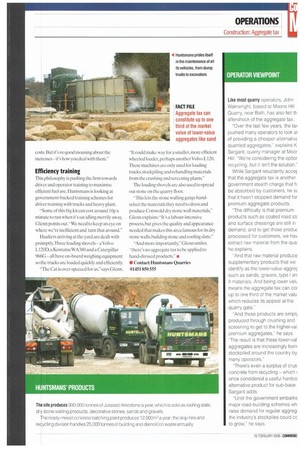OPERATOR VIEWPOINT
Page 53

If you've noticed an error in this article please click here to report it so we can fix it.
Like most quarry operators, John Wainwright. based at Moons Hill Quarry, near Bath. has also felt th aftershock of the aggregate tax.
"Over the last few years, the ta> pushed many operators to look al of providing a cheaper alternative quarried aggregates," explains K Sargant, quarry manager at Moor Hill, "We're considering the optior recycling, but it isn't the solution!
While Sargant reluctantly acce that the aggregate tax is another government stealth charge that h be absorbed by customers, he that it hasn't stopped demand for premium aggregate products.
"The difficulty is that premium products such as coated road stc and surface dressings are still in demand, and to get those produc processed for customers, we hay extract raw material from the qua he explains.
"And that raw material produce supplementary products that we identify as the lower-value aggrec such as sands, gravels, type I an II materials. And being lower valti means the aggregate tax can car up to one third of the market valu which reduces its appeal at the quarry gate."
"And these products are simpl) produced through crushing and screening to get to the higher-val premium aggregates," he says. "The result is that these lower-val aggregates are increasingly bein stockpiled around the country by many operators.
"There's even a surplus of crus concrete from recycling which s once considered a useful hardco alternative product for sub-base Sargant adds.
"Until the government embarks major road-building schemes wh raise demand for regular aggreg. the industry's stockpiles could cc to grow," he says.






































































































































































































